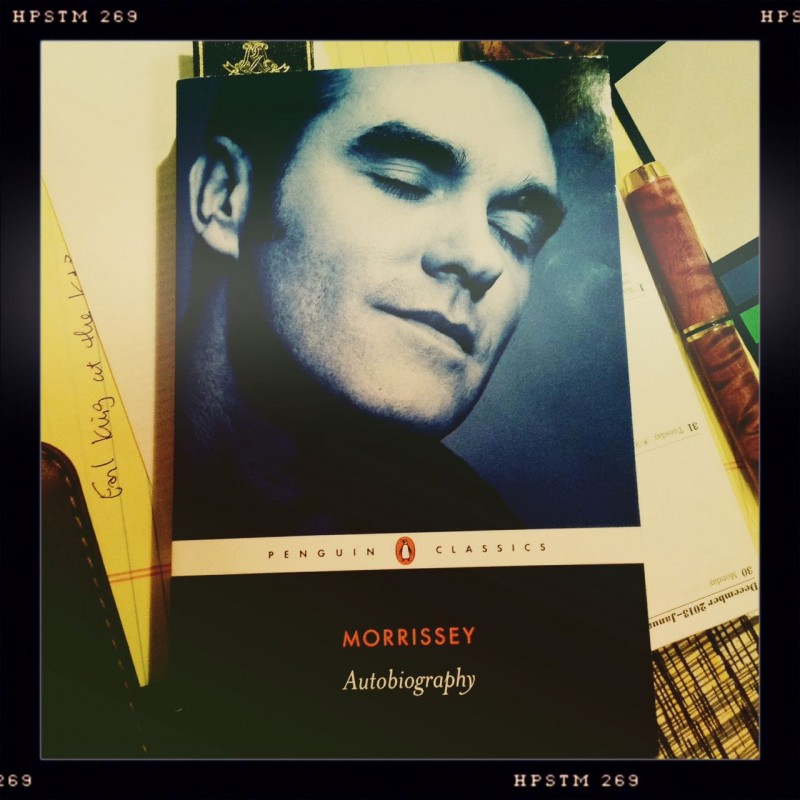
21 Jan Book Report
I was never a huge Smiths fan—my first Smiths CD was not acquired until over 20 years after the band had broken up. I found Morrissey interesting, however. His resolutely obtuse public persona and the band’s visual presentation were intriguing to me. I went to see Morrissey in concert in 2011 and he was in excellent voice and put on a great show. Enjoyable though it was, it was not sufficient to inspire me to dive into the extensive Smiths/Morrissey back catalog, remorseful over remembrance of fandom lost.
When in October of last year I read that Morrissey had written an autobiography (published on the Penguin Classics imprint—however did he manage that?) my interest was piqued anew. I immediately ordered a copy—the book’s initial release was UK only—and put it on the stack to be addressed after I finished the current volume. It only seemed fitting as the current volume was Richard Ellmann’s monumental biography of Oscar Wilde.
Times have changed. I’ve no idea whether Manchester is still the bleak cultural wasteland of Steven Morrissey’s youth (a place he describes as being “more brittle and less courteous than anywhere on earth”), but he has reached the ripe old age of 54 without being brutally broken on the wheel of British justice. Perhaps Morrissey’s Bosie has not yet made himself apparent, but even if he did it would take substantially more than the ravings of a contemporary Marquess of Queensberry to send the singer off to hard labor in Reading Gaol. Morrissey’s prison is an existential one and one gets the impression that he would be happy to have us believe that his is a life sentence.
Admittedly, I am making certain assumptions here. It did not escape my notice, however, that Morrissey’s Autobiography was published on October 22—the birthday of none other than Lord Alfred ‘Bosie’ Douglas. Hmmm…
Here are some select passages from the book:
On being called a bad influence by the mother of a friend:
I ponder on how I could possibly be considered a bad influence, since I am neither bad nor remotely influential.
On Nico:
Nico was an unclassifiable artist and largely disregarded as a gifted amateur who took far too much refuge in horror. Her youth’s beauty dissolved into a lifelong lusty love of heroin that turned her into a shapeless object that moved along the ground like a shifting smog… I treasure her four studio albums, none of which contain the faintest hint of hope.
On applying for a job as a postman:
I am cross-examined at Stretford sorting office as there are postman vacancies, and this is the most I consider possible. Yet it isn’t, because I am turned down – deemed physically and psychologically incapable of delivering letters. There is now no escape but death.
On the opening of the Hacienda Club in Manchester:
Linder (Sterling) and I attended the opening night of the Hacienda club, which was initially for the secret agony of the secret public, but soon stuffed coaches from Blackburn and Bolton would pull up outside, unloading disfigured disco dancers and goblin-esque pork-pie chubbos with carroty-red curls smelling of pickled pig who claim the Hacienda as their own public toilet.
On Rough Trade, the Smiths’ record label:
Everything was a question of personal identity, and Rough Trade set out to assert autonomy whilst at the same time challenging the established order. They did this largely by pressing records that no one wanted to buy.
On his first London flat:
The flat is haunted – as everyone who calls by testifies (even if the chilled atmosphere is initially assumed to be me). Air of leaden fatigue hangs outside of the bathroom, as if something is standing right there in the hallway. There is also a heavy sense of sadness in the bedroom where I sleep, an atmosphere I am used to leaving behind – but not finding as I arrive.
On the Smith’s first Japanese release:
I vomit profusely when I discover that the album has been pressed in Japan with Sandie Shaw’s version of Hand In Glove included. I am so disgusted by this that I beg people to kill me. Many rush forward.
